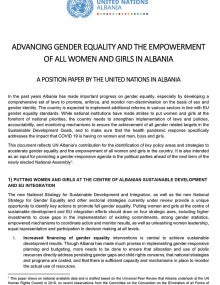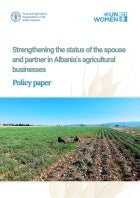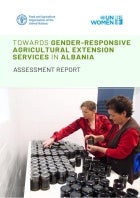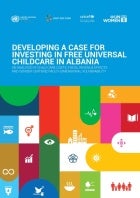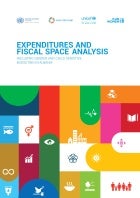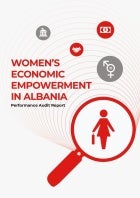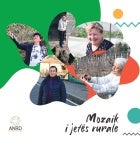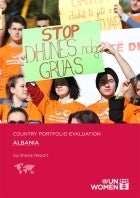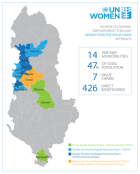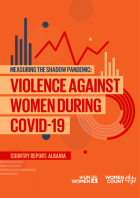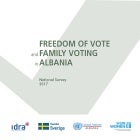1 - 17 of 17 Results
Date:
This policy paper highlights best practices from Belgium, France, and Spain, offering valuable insights for Albania as it advances toward EU accession and gender equality, with the aim of promoting women's rights and boosting economic opportunities in agriculture.
Date:
This document presents the findings of a qualitative study that assessed the extent, progress and challenges of providing gender-responsive agricultural extension services in Albania.
Date:
The study provides concrete evidence on how gender sensitive public investment has important ramifications in terms of who benefits from child care and job creation. Beyond “who” benefits, the report also presents a comparative analysis of “how much and what kind of” benefits can be expected from each additional dollar gender-sensitive public spending versus gender-blind spending in universal child care.
Date:
This analysis aims to shed light on the scope of gender responsive fiscal policies to address gender and child sensitive socio-economic vulnerabilities. This report analyzes the selected gender-sensitive fiscal policy and the mechanisms through which the policies affect social protection systems including women labor force participation, wage gaps, GDP growth, public fiscal balances, income distribution, and poverty.
Date:
The Supreme State Audit Institution in Albania has conducted a performance audit on the “Economic Empowerment of Women”, in the framework of the “Transformative Financing for Gender Equality Towards More Transparent, Inclusive and Accountable Governance in the Western Balkans” project, financed by the Government of Sweden – SIDA, with the technical support of UN Women Albania.
Date:
This photo album aims to showcase rural Albania, where women take on many roles. It contains different stories of women and girls from the areas of Puka, Elbasan and Kolonja, focusing on their challenges in their daily lives, family, work and leisure. This photo album was prepared by Albanian Network for Rural Development, a UN Women partner within the "Gender Rural Equality and Torusim” (GREAT) project, financed by the Italian Government.
Date:
This report presents the main findings, lessons learned, conclusions and recommendations of the Country Portfolio Evaluation of the UN Women Albania Country Office Strategic Note 2017– 2021, conducted between January and July 2021.
Date:
This publication describes UN Women Albania’s programme of work for the period 2022-2026. It highlights key areas of contribution of the Country Office across UN Women’s triple mandate of UN Coordination, normative support and operational activities.
Date:
In the framework of the Gender Sensitive post-earthquake Recovery and Reconstruction project, UN Women conducted 10 Gender Sensitive Value Chain Analysis (GSVCA) in the earthquake-affected municipalities of Shijak, Durrës, Krujë, Tiranë, Kavajë, Vorë, Rrogozhinë, Kurbin, Mirditë and Lezhë. These GSVCAs identify and promote ‘win-win’ scenarios that guarantee market sustainability, and provide development opportunities that address problems in a value chain in conjunction with addressing gender inequalities inherent in and along the chain.
Date:
This publication compiles and analyses the results of Rapid Gender Assessment surveys on the impact of COVID-19 on violence against women (VAW RGAs) in Albania.
Date:
“Women and Men in Albania” is published yearly by the Albanian Institute of Statistics (INSTAT) and displays data disaggregated by gender, aiming at the collection, analysis, and presentation of statistics by gender, and mirroring the social issues encountered on the cross-cutting policies monitoring, in the framework of achieving gender equality.
Date:
This publication has been produced by UN Women Albania to assess the impact of COVID-19 pandemic on main challenges faced by women and men, and how the changing situation is affecting the socio-economic situation and livelihood of women and men.
Date:
The report offers a concise, data-driven look at the implementation of the Beijing Platform for Action and issues a clarion call for stepping up progress to realize the promises of Beijing. It covers countries from the United Nations Economic Commission for Europe region and it is based on available data and information in the regional and global databases.
Date:
“Women and Men in Albania” is an annual publication, which presents data on different areas of life divided by gender, in order to reflect the problems of society in terms of achieving gender equality.
Date:
To bring women’s views and solutions to the forefront of discussions and decisions on COVID-19 response, UN Women initiated rapid consultations with women’s organizations across the Europe and Central Asia region. The consultations provided an opportunity to hear directly about the specific risks and challenges that women and girls face as a result of the COVID-19 pandemic; they also focused on the opportunities and solutions they are providing so that the strategic focus of support can be adjusted in a gender-responsive manner to reflect their differentiated experience.
Date:
Women and Men in Albania” is a yearly publication by the Institute of Statistics in Albania that brings to the public comprehensive information on gender statistics in the country. 2018 edition contains for the first time data about causes of death and about internal migration of women and men.
Date:
Following the first survey (2014), which focused on the situation of women in Albania in regards to their voting behavior, the 2017 survey was conducted to elicit citizen opinions on different practices that might intervene with the freedom of voting as well as understand and identify the current systemic flaws behind the high occurrence of such practices.
